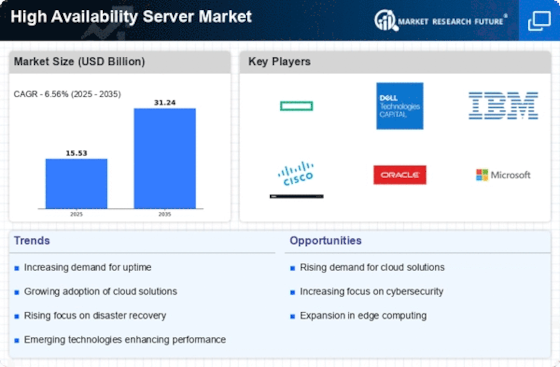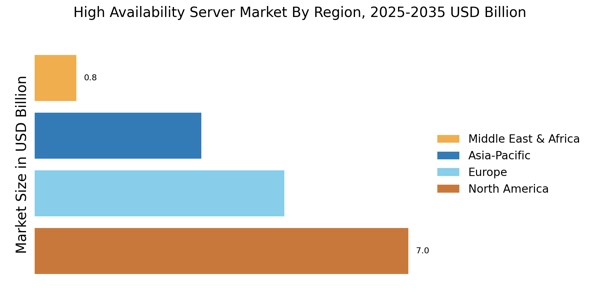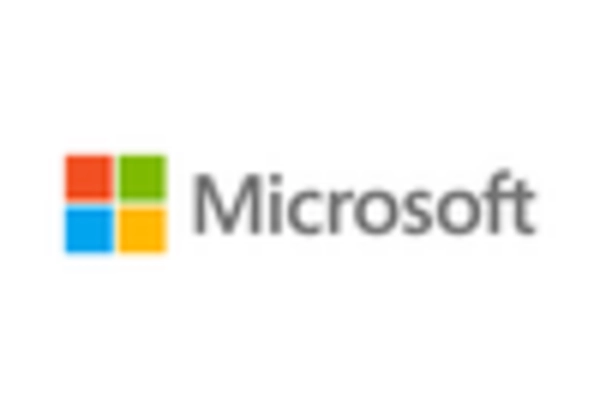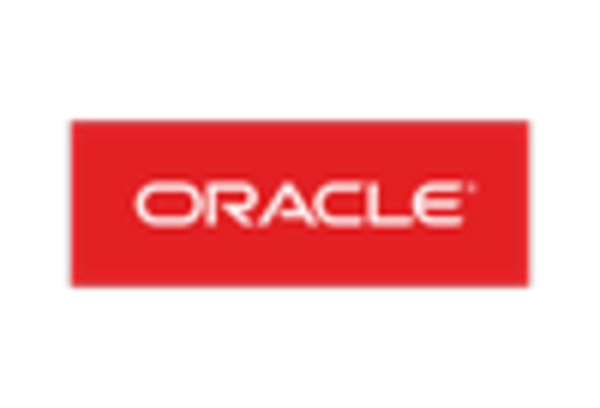Rising Demand for Uninterrupted Services
The High Availability Server Market is experiencing a notable surge in demand for uninterrupted services across various sectors. Organizations are increasingly reliant on continuous operations, which necessitates robust server solutions that minimize downtime. According to recent data, the market for high availability servers is projected to grow at a compound annual growth rate of approximately 10% over the next five years. This growth is driven by the need for businesses to maintain operational efficiency and customer satisfaction. Industries such as finance, healthcare, and e-commerce are particularly focused on ensuring that their services remain available at all times. As a result, investments in high availability server solutions are becoming a priority, reflecting a broader trend towards operational resilience.
Growing Adoption of Hybrid IT Environments
The High Availability Server Market is witnessing a growing adoption of hybrid IT environments, which combine on-premises infrastructure with cloud-based solutions. This trend is driven by organizations seeking flexibility and scalability in their IT operations. High availability servers are essential in these hybrid setups, as they ensure seamless integration and uninterrupted service delivery across different platforms. Market analysis indicates that the hybrid IT segment is expected to account for a significant portion of the overall high availability server market, with projections suggesting a growth rate of around 12% in the coming years. As businesses increasingly embrace hybrid models, the demand for high availability solutions that can support these environments is likely to rise.
Increased Focus on Business Continuity Planning
The High Availability Server Market is significantly influenced by the growing emphasis on business continuity planning. Organizations are recognizing the critical importance of having robust systems in place to ensure operational continuity in the face of unexpected disruptions. This has led to an increased investment in high availability server solutions, which are essential for maintaining service levels during outages. Recent surveys indicate that nearly 70% of businesses are prioritizing investments in technologies that support business continuity. As a result, the high availability server market is poised for growth, as companies seek to mitigate risks associated with downtime and enhance their overall resilience.
Technological Advancements in Server Infrastructure
Technological advancements are playing a pivotal role in shaping the High Availability Server Market. Innovations in server architecture, virtualization, and cloud computing are enhancing the capabilities of high availability solutions. For instance, the integration of artificial intelligence and machine learning into server management is enabling predictive maintenance and automated failover processes. This not only improves system reliability but also reduces operational costs. The market is witnessing a shift towards more sophisticated server infrastructures that can handle increased workloads while ensuring minimal downtime. As organizations seek to leverage these advancements, the demand for high availability servers is expected to rise, with market analysts estimating a growth trajectory that aligns with these technological trends.
Regulatory Compliance and Data Protection Requirements
Regulatory compliance and data protection requirements are driving the High Availability Server Market. With the implementation of stringent regulations such as GDPR and HIPAA, organizations are compelled to adopt high availability solutions that ensure data integrity and availability. Compliance mandates necessitate that businesses maintain continuous access to critical data, which in turn fuels the demand for high availability servers. Market data suggests that sectors such as finance and healthcare are particularly affected, as they face severe penalties for non-compliance. Consequently, the need for reliable server solutions that meet these regulatory standards is becoming increasingly urgent, thereby propelling market growth.

















